Special reports
Why Binga’s ‘great river people’ feel cut off from their trade
Published
4 years agoon
By
VicFallsLive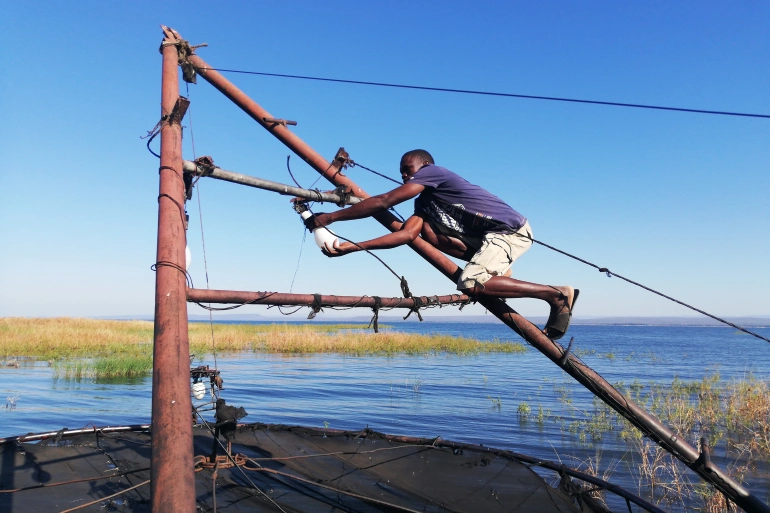
BY FARAI MATAISHE
It is mid-morning in Binga district, on the shores of the Zambezi River, and the sun is already scorching.
Takuchinchi Munsaka of the Batonga tribe services the diesel-powered engine of his fishing rig – a boat made up of cylindrical metal at the base, which allows it to float, and energy-saving lightbulbs at the top which help attract kapenta when the fisherman goes out at night.
Strong river torrents move to and from the shore, almost threatening to carry the boats away on this mighty river sandwiched between Zimbabwe and Zambia, while the loud engines of surrounding rigs whine and rattle – drowning out conversations between fishermen on nearby boats.
When night falls, Munsaka (31), will sail his rig out across the river, lower his black nets into the water below, and fish – kulabula as it is called in his local Tonga language.
Fishing has been a part of his community for generations.
But in recent years, it has become increasingly difficult for many to make it out onto the river at all.
The reason: fishing permits.
A fishing permit is a legally mandated licence, renewable every three or 12 months, that commercial fishermen are required to have to fish in the Zambezi River.
Issued by the Zimbabwe Parks and Wildlife Management Authority (ZimParks), a state agency responsible for wildlife conservation in the country, the permits were introduced in 1990 in a bid to regulate the number of fishers, thus preventing overfishing and aiding conservation.
Those caught fishing without a licence can be fined $2,000 and have their boat impounded.
But the relatively high cost – US$1,200 for a yearly permit, plus thousands of dollars to build a fishing rig that meets government regulations – and the limited number of permits handed out each year, has disproportionately benefitted wealthy fishers from the cities at the expense of communities like the Batonga, locals say.
‘I had to survive’
Munsaka, who is a father of two, lives in Muyobe village, a remote rural community some 50 kilometres from Binga Centre, the financial hub of the district of about 139,000 people.
A tall man of medium build, he has spent much of his life working on the river.
He started young, fighting his way into the fishing industry as a boy, he says.
“When I reached teenage years, I started buying kapenta from fishermen from the city. I walked for nearly five kilometres up the hills from the Zambezi River to Binga Centre with about 30kg of kapenta, on my back. This was for resale to the locals,” he recounted.
In 2012, he tried to secure his own fishing rig, but he had no capital to buy or build one.
And without a boat or rig, he could not get a fishing permit.
Munsaka eventually got a job working for someone else who had a fishing rig and a permit.
“I was paid on commission based on a ‘tonnage system’.
For a captain, if he manages one tonne of kapenta, he was paid US$80 per month while crew members like me were paid US$75 per month,” said Munsaka, whose job involved lowering the nets into the water.
“The working conditions were exploitative but I had no choice.
I had to survive,” he adds.
He feels it was this exploitation that pushed him to work harder, so that he could make money and one day achieve his dream of owning his own fishing rig and getting a permit.
Since 2017, he has rented a permit and a boat from a relative who is among the few Batonga people to have fishing licences in Binga.
Leasing one’s permits to other fishermen is a practice ZimParks does not object to as, according to Tinashe Farawo, a ZimParks spokesperson, “subleasing does not add any fishing rigs into the river”.
By 2020, Munsaka had raised enough money for his fishing rig, which cost $8,000 to build.
He applied for a fishing permit from ZimParks that same year but is yet to be given one.
“I was supposed to be given the permit in June 2021 but I still have not heard from ZimParks. This year I am not sure if I will get it. Perhaps next year,” he said.
‘It’s who we are as people’
Munsaka’s forefathers have fished along the Zambezi River for generations.
Before white colonialists occupied the country, then called Rhodesia, the Batonga were known as “the great river people” and lived in Kariba, making their livelihoods along the river where they could fish and practise agriculture in the surrounding fertile wetlands throughout the year.
Historically, the tribe relied on fish as a source of protein and on fishing for their survival.
These natural resources were freely available to them, and from a young age, Batonga would be taught to fish using tools like fishing baskets and canoes.
They would fish along the Zambezi and its tributaries without fear of breaching any laws, as there were no state regulations on fishing methods, or which part of the river to fish in, or the quantity of fish one could catch.
But all that changed in the 1950s when the colonial government forcibly moved the Batonga to make way for the construction of the Kariba Dam.
Most were resettled in Binga, about 484km away, but some were relocated as far as Siabuwa, 84km from the Zambezi River – making it impossible for them to maintain their normal riverside existence.
After the resettlement, Batonga were given “compensation” in the form of grain to sustain them until they could somehow farm in this otherwise barren land filled with drought-resistant mopane, acacia and baobab trees.
But being cut off from the river, and the tougher restrictions on fishing licences that were introduced in subsequent decades, made much of the tribe feel that their way of life was criminalised.
“Fishing for us has been an important factor being our nutrition as well as being important in our economy. We trace it to who we are as a people,” said Prince Dubeko Sibanda, an opposition party MDC-Alliance member of parliament for Binga North.
“Fishing is not only for economic and other social reasons, but it is part and parcel of our life, it has been part and parcel of our culture,” he said, adding that the colonial laws which were introduced in a bid to conserve the fishing sector were not inclusive of the tribe.
After the construction of the Kariba Dam in the 1950s, the then-Rhodesian government introduced other species of fish such as kapenta in a bid to commercialise the sector.
By the 1970s the sector was flourishing, but with fears of possible overfishing in the Zambezi River and Lake Kariba, licensing processes and regulations were tightened.
During these pre-Independence times, the industry was dominated by white people, while Black people – including the Batonga – had limited access to licences.
Most Batonga in the fisheries sector at the time worked for white people.
After 1980, when Zimbabwe gained independence, the licensing regulations were eased slightly to allow Black people to enter the sector.
The government also introduced a cooperative system – an initiative where a minimum of 10 people could come together to apply for fishing permits.
This was aimed at compensating and empowering the Batonga who had been affected by the displacements in Kariba in the 1950s.
However, the cooperative system was later monopolised by politicians and businessmen, resulting in non-Batonga people benefitting more than the locals, said Munsaka.
Barriers and costs
Today, the Batonga number some 300,000 people and are situated between the northern parts of Zimbabwe (including Binga) and the southern parts of Zambia.
Four decades after independence, Binga, which is one of the most sparsely populated districts in Zimbabwe, has remained under-developed with inaccessible roads, poor connectivity and inadequate infrastructure such as schools and clinics.
Many Batonga homes have no electricity, despite it being generated from Lake Kariba – which lies in the valley that used to be their home – and supplied to cities hundreds of kilometres away.
Farming is not always viable, due to poor soil and insufficient rain, so the Batonga have limited sources of income.
Some depend on traditional craft-making – basketry, wood-carving, textile and jewellery making; others survive on remittances from the diaspora – relatives who live mainly in Zambia, South Africa and Botswana.
Wealthy residents of Harare often come to Binga to enjoy its sand beach, hot springs, boat cruises and recreational fishing. But for most Batonga people, fishing is not a recreational activity – it is their means of survival. To sustain what has historically been their primary source of income, however, they are now required to pay.
Fishermen in Binga believe these levies should be decreased.
“Many locals cannot afford the US$1,200 fees required [for the fishing permit],” says Givemore Gwafa, a chairperson of the Binga Fisheries Association, a membership-based local trade union that represents fishermen. “This is a barrier to many current and aspirant fishermen.”
Civic society groups have expressed and called for the government to relax its licensing process to accommodate more Batonga fishermen.
Cooperatives
Since the 1980s some Batonga from Binga and Kariba have formed cooperatives under the Ministry of Women Affairs, Community, Small and Medium Enterprises to apply for permits from ZimParks.
Tapiwa Mateiswana (40), a Tonga from Shangwe in Kariba, started fishing in 1991, working for rig owners from Harare. But in 2019, he got his own rig and a permit through a cooperative.
“I have been applying as individual several times with no success,” he said, sitting at an old resort-turned-harbour for fishing rigs on the shore of Zambezi in Binga.
The father of 14 children sits barefoot on a wooden stool, wearing brown shorts and a pink shirt. He holds a spanner in his right hand as he talks, determined to finish servicing the diesel-powered engine of his fishing rig before night falls.
He explains that the cooperative system has paid off for him.
“In 2019, we were advised to join hands and apply for the fishing permits as a cooperative. We were lucky we got the licences,” he said, smiling.
While fishermen in Binga say they struggle to get even single permits, Munsaka said he knows of some people from the city who have several permits per person.
“These people from the city have money, some are businesspeople. They just apply and get the licences.
They have the money to have as many fishing vessels as possible.
It is sad that the Batonga people are failing to get even one licence while some rich people from the city can get as many as they want,” he says.
But Clever Mutondori, who relocated to Binga in 2010 from Marondera, about 70km outside Harare, told Al Jazeera that he faced the same struggle as the locals when trying to get a fishing permit.
“I ventured into fishing by buying from local fishermen and resale in Bulawayo and Harare.
I wanted to raise money to buy my own fishing rig. I bought a second-hand rig in 2011 and started fishing in 2012.
“I then started buying several fishing rigs. By December 2014, I had 12 fishing rigs,” said Mutondori.
“The permits I used were all on lease …
‘It was tough to get permits because the authorities tried to minimise the number of fishermen. In 2015, I finally got the fishing permits with assistance from a local chief.”
ZimParks’ Farawo said granting licences to everyone who applies would threaten conservation.
“We risk overfishing. There is a need to make decisions based on scientific assessments. Kariba alone has 275 commercial licences for Zimbabweans and 225 for Zambians,” he says.
“All local headmen have fishing licences and most members of the community belong to cooperatives.
“However, some that have received licences have hired them to other people.”
Making a living from fishing
Munsaka and Mateiswana have been able to look after their families from incomes generated from the fishing industry.
Mateiswana said he uses the profits to pay the school fees for his children “as well as buying all other essentials for the family”.
“I am glad that with this business I am able to make sure that none of my children goes to bed with an empty stomach,” he said.
Fishing is Munsaka’s only source of income.
“In a good month, I can get about 16 bags of kapenta with each bag weighing 30kgs,” he said.
But over the years, overfishing has affected his catch.
“I remember in 2017 when I started renting this fishing rig and permit, I would get about 30 bags with each weighing 30kgs of kapenta in April. But in April 2021, I got about 12 bags of kapenta,” he said.
From the 16 bags he gets today, he says he gives 10 to the fishing vessel owner and keeps the last six for himself to sell.
“There is not much profit. But I have no choice as I want to put food on the table for my family.”
Munsaka says his kapenta attracts buyers from as far away as Bulawayo and Harare.
“We sell our catch to people in Binga and to those from Harare and Bulawayo at wholesale prices.”
He has even employed three people, a captain and two crew members.
But with a reduced catch, he sometimes struggles to pay his workers. “Worse is budgeting the $1,200 for the annual fishing permit,” he added.
Binga Fisheries Association’s Gwafa says fishing produce has gone down over the years due to a number of factors from overfishing, poachers and poor conversation between the fishermen.
He says their counterparts in Zambia often drift into Zimbabwean waters, affecting the conservation efforts of the locals.
“Some fishermen with nets disturb these breeding places. Once the process is disturbed, our production goes down.”
‘I am related to these waters’
Sibanda, the MP for Binga North, describes how, before they were moved in the 1950s and before state regulations for fishing were introduced, the tribe had its own way of practising sustainable fishing and preserving the natural resources.
“The resettlement changed everything,” he said.
“It is not like that we the Batonga never knew how to conserve fish. We knew. The laws that came into place changed the manner we looked at conservation.”
Sibanda said that for the Batonga people to once again benefit from fishing there is a need for the devolution of some decision-making power from the national to the provincial level.
This would empower local authorities to spearhead economic and social development projects in their areas by leveraging local resources.
“We need to make sure that the laws are decided at the level they are implemented.
“We allow the people that are surrounded by the resources to be the people who help in deciding the crafting of the law as well as its implementation,” he said.
“If the Batonga people are to benefit from the fish that God gave them, the board that decides on the fishing laws and the board that give the fishing licences should be controlled by people that are in Binga rather than from Harare.”
For Munsaka, he still hopes that one day the authorities will grant him a licence.
“I am related to these waters,” he said. “I will keep on renting the permit until I get mine, I will never give up.” Aljazeera
You may like
Slider
From discarded glass to second chances: How conservation is rebuilding the lives of Zambia’s street boys
Published
20 hours agoon
January 19, 2026By
VicFallsLive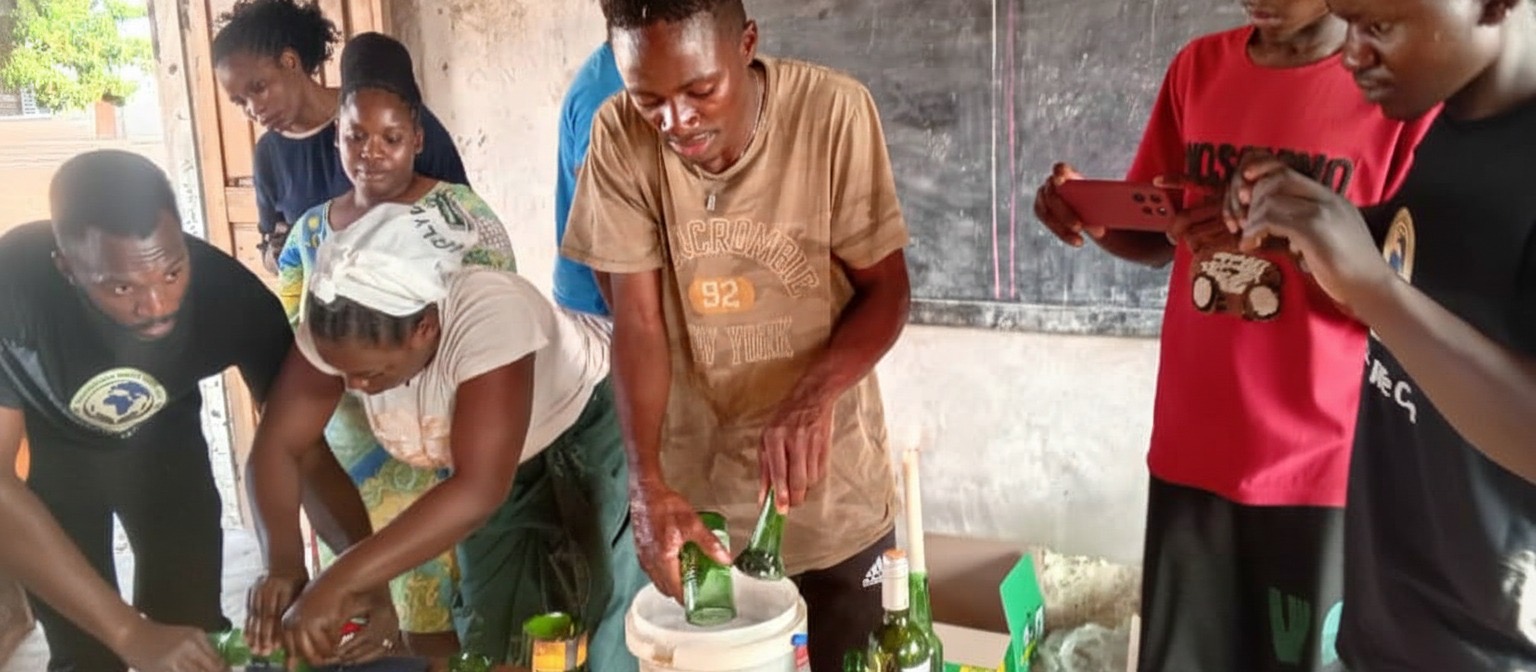
BY NOKUTHABA DLAMINI
Livingstone, Zambia — In Maloni township, the sound of glass snapping cleanly against a cutter echoes through the yard of a modest home. What was once a discarded beer bottle now sits neatly trimmed, smoothed into a drinking glass. For a group of young men long dismissed as “junkies,” this simple act has become the beginning of a second chance.
At the centre of this transformation is Songiso Mukena, a conservationist, tourism practitioner and founder of the Responsible Earth Keepers Foundation (REK). Through conservation work, recycling, football and mentorship, Mukena is quietly rewriting the futures of boys once written off by their own communities.
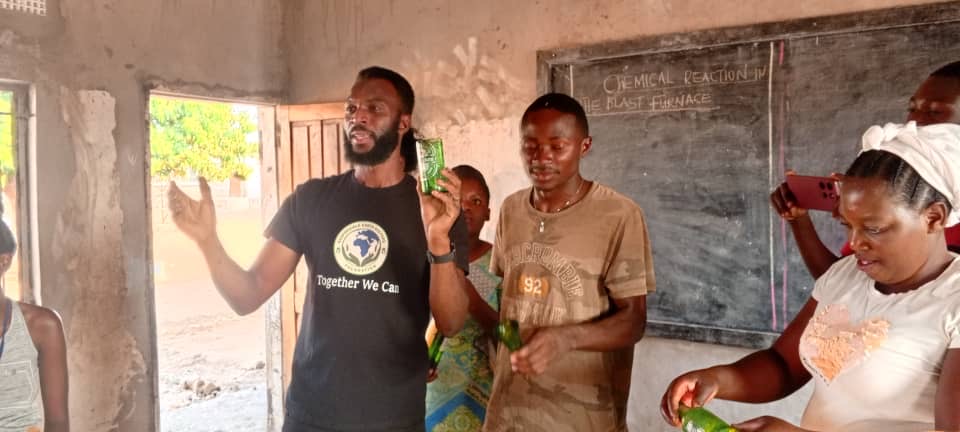
“My name is Songiso Mukena from Livingstone, Zambia,” he says. “I am the founder of Responsible Earth Keepers Foundation – a non-profit making organisation.”
A journey rooted in hospitality and conservation
Mukena’s passion for conservation grew out of more than 15 years working in Zambia’s hospitality industry. While employed at Jolly Boys Backpackers in Livingstone, he was involved in a programme focused on responsible tourism and waste management.
“For me, it was just work,” he explains. “It was all about waste separation, finding a better place where to take or whom to give. We were doing worm farming and also just learning how to manage waste.”
That experience sparked a deeper interest. “I think it’s one of the places I worked that really opened my mind,” he says.
In 2016, a visit to a recycling organisation became a defining moment.
“I was amazed with what I saw,” Mukena recalls. “They were giving life back to bottles that were discarded out there or thrown out. They would cut them, make candle holders, lanterns and drinking glasses.”
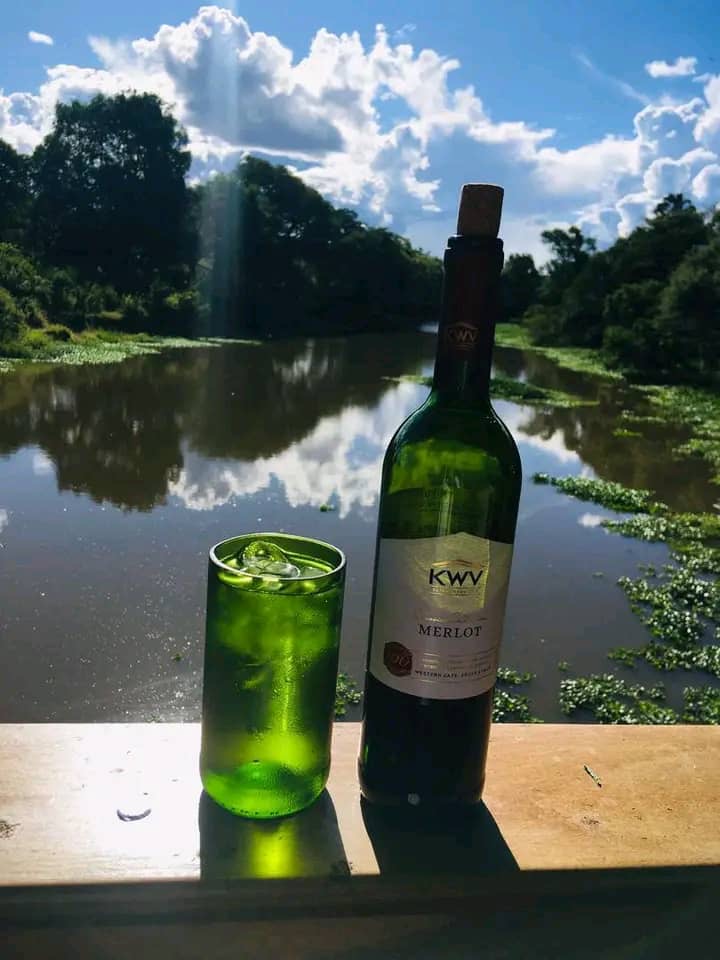
Although he wasn’t taught the technique, the idea stayed with him. “I started doing research on how to cut a bottle and make a drinking glass,” he says. “It wasn’t easy.”
A breakthrough came when former employers, Mr and Mrs Sikaneta of Munga Eco-Lodge, donated a glass cutter.
“I started practicing and practicing,” Mukena says. “The whole of 2017 I was practicing. In 2018, I started taking bottles to my house and cutting them.”
Soon, people began buying the glasses.
“For me, my mind shifted,” he says. “I thought, I think this can be a big idea on recycling.”
COVID-19 and a move into the community
The COVID-19 pandemic forced Mukena out of employment as tourism ground to a halt. He moved from Linda township to his own plot in Maloni, an area facing deep social challenges.
“It’s a remote area,” he explains. “It’s one of the places where you find early pregnancies, boys failing exams and turning into what today are called junkies.”
Many of these boys had gone through traditional initiation ceremonies, after which they were often stigmatised.
“When they come back, the community views them in a different way,” Mukena says. “Once you go there and come back, you are not taken as a normal boy child.”
Instead of distancing himself, Mukena opened his space to them.
“I started teaching those boys how to cut bottles, making drinking glasses,” he says. “We started with about ten boys.”

The glasses were sold, and the money shared according to need.
“If one lacked shoes, we would sponsor that,” Mukena explains. “If another boy wanted to go back to school and lacked books, we helped.”
Healing beyond skills
The transformation was not just physical or financial. Mukena’s wife, Yvonne, a psychosocial counsellor, joined the initiative.
“She started talking to the boys,” he says. “Trying to get their minds shifted.”
Their home became a safe space.
“Our home became a home of many,” Mukena says. “Some kids would come just to play.”
Recycling soon funded broader social causes.
“We said, how about we sell these glasses back into the charity to help make it self-sustainable? Mukena explains. “Waste management became a starting point for other projects.”
Football as a tool for dignity
Football emerged naturally from the boys themselves.
“They were already playing – and with real talent,” Mukena says. “One day they came and said, ‘Father, we want to play City Stars and we’ll win!”’ City Stars is a professional team.
Recognising their talent and passion, the boys asked for support.
“They said, if possible, can you organise football kits for us?” he recalls.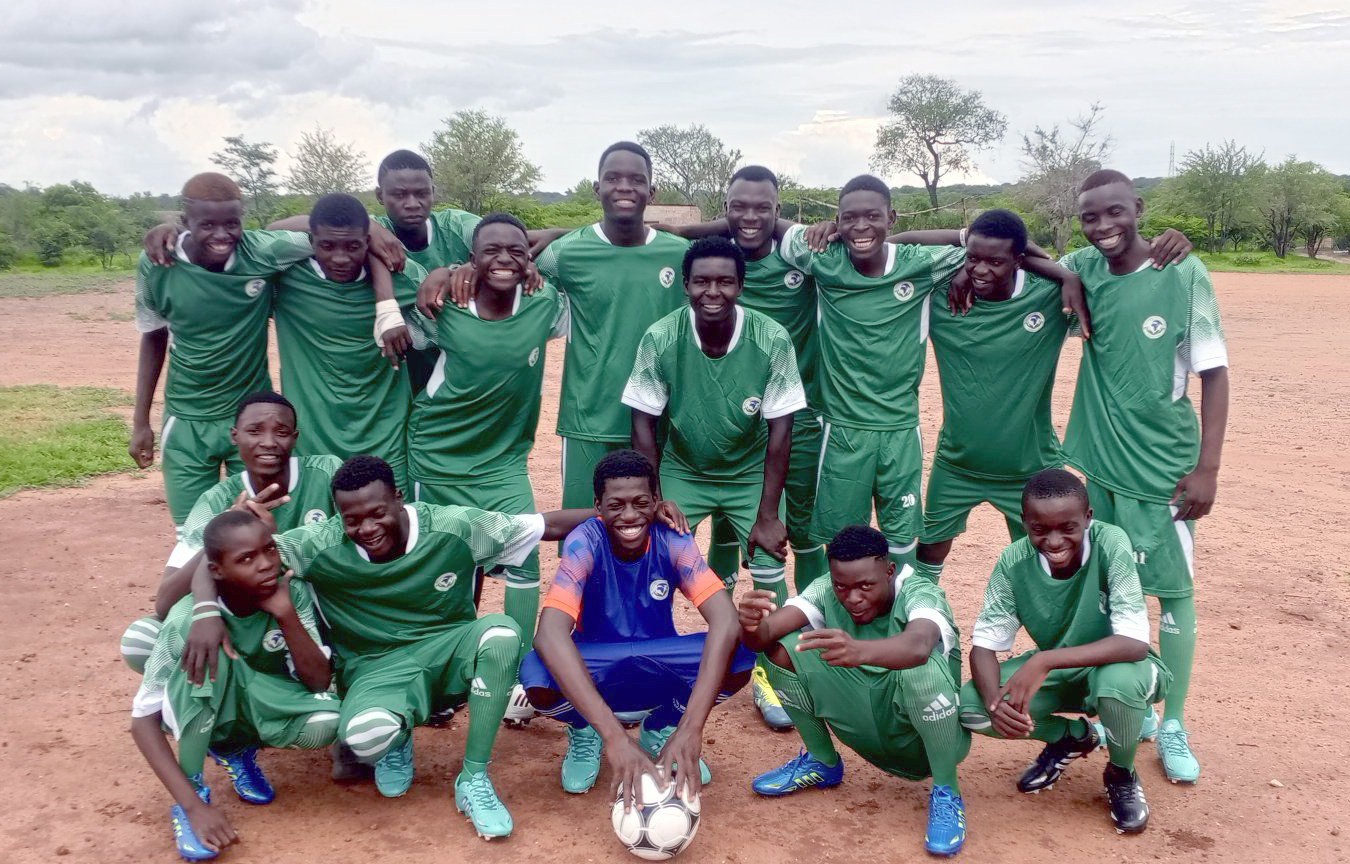
A local church donated land for a pitch, and REK FC was formed. Recycling income helped support the charity’s activities, linking conservation directly to sport.
Football also brought structure, discipline and confidence.
“We don’t just concentrate on soccer,” he says. “We also give motivational talks, encouragements, testimonies and Bible readings. At the end of the day, it’s a mind change that we are looking for.”
Support from abroad, built on trust and friendship
Among those drawn to support Mukena’s work were two tourists from the UK, Simon Greene and Audrey Furnell. Simon explains why grassroots initiatives resonate with donors today:
“In return for a relatively modest donation anyone can make a tangible difference. Supporters like us can see a direct return on what we give which is incredibly rewarding.”
Simon says this is exactly the kind of work they want to promote.
“We’ve learnt a huge amount from Song and Yvonne and were struck by their kindness and impressed by their drive to do more for his community,” Simon says.
Their family’s support began with a classroom project in Linda, expanded to monthly assistance for school needs, and later funded a borehole near Kazungula.
When introduced to the boys of Maloni, Audrey says:
“We saw their passion for football and it was clear they deserved the chance to be their best on the field – but without proper kit that could never happen.”
Soon afterwards, Simon recalls:
“Songiso lost no time, organised all the kit and immediately arranged a match on Christmas Eve with REK FC playing against a professional team. We were thrilled.”
Rewriting the story of the boy child
Mukena believes the project addresses a wider national issue.
“There was a campaign for educating the girl child,” he says. “That campaign was done very thoroughly. But the boy child was left behind.”
He believes that neglect has contributed to rising numbers of boys labelled as criminals and drug users.
“When a boy’s mind is changed,” Mukena says, “it’s an achievement for the organisation, the community and the country.”
Today, REK works with approximately 100 boys aged between 15 and 22, with about 25 actively involved in recycling and football.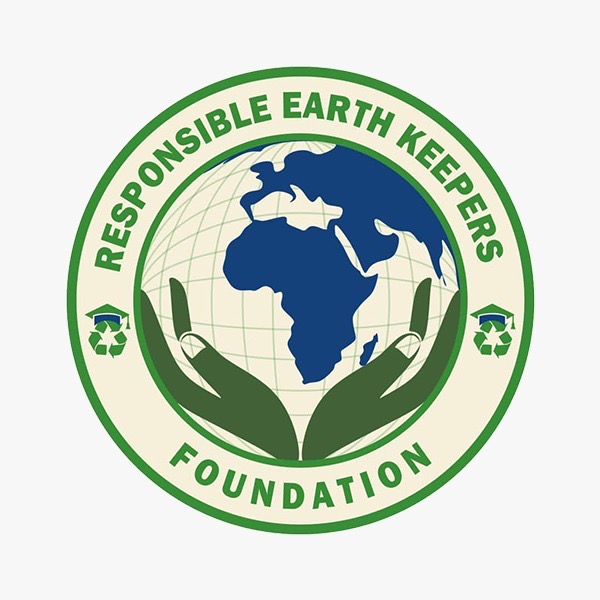
The long-term goal is to establish a recycling and skills training centre employing youth from the community.
“We want a better community,” Mukena says.
Small acts, lasting change
In Maloni, discarded bottles are no longer just waste. They are tools of transformation — funding education, restoring dignity and giving young men a reason to believe in themselves.
For Mukena, success is simple.
“One day we hope a boy will be picked to play for a professional team,” he says, “that will be an incredible achievement for him — and for us.”
And for Simon and Audrey:
“We feel blessed to have Songiso in our lives. Being able to see REK make valuable improvements like these is very rewarding. We’d like more people in the wider donor community to act as we have – together we can make a difference.”
Slider
From skins to steaks — How wildlife trade is fueling communities in South Africa
Published
1 month agoon
December 11, 2025By
VicFallsLive
BY NOKUTHABA DLAMINI
In the small town of Bela-Bela, a quietly flourishing business is unfolding — one that turns wildlife into livelihood, education, and economic opportunity. On a humid afternoon, we walked into the operations of Estelle Nel Taxidermy (and its parent networks), where rows of beautiful animal mounts — from antelope horns to zebra skins, skulls to full-body trophies — line the walls.

But beyond the busts and custom mounts lies a deeper purpose: this is not simply a display of hunting trophies. It is a system of sustainable use — where animals that die naturally or are hunted legally are completely utilised: meat, skin, horns, bones — nothing goes to waste, and everything acquires value.
As we discovered from our conversations, this network extends beyond taxidermy. Adjacent to the showrooms are processing facilities, butcheries, and game-meat wholesalers — all integral to transforming South Africa’s wild fauna into a formal, regulated, and sustainable economy.
“This is home” — an artisan’s vocation
I sat down with Melanie Viljoen, who serves as Export Secretary at Estelle Nel Taxidermy. Her voice was calm, resolute.

“For me, it’s like this is home and it’s something that I love to do. I love art. I studied art at school. I can’t think of anything else I’d rather do.”
She told us she’s been with the business for thirteen to fourteen years. Over that time she’s mastered a unique craft. “I’ve found my niche,” she said, “and I’m not going anywhere.”
Melanie explained how the business flows: outfitters bring in international clients to hunt on private farms, then process the animals: trophy mounts for some, meat for others. Locals also bring animals — sometimes for trophies, sometimes just for meat. There is even “school-mount” work: smaller species, sometimes a mother and its young, carefully preserved — not just for hunters, but for children to touch and learn about wildlife up close.
“We mount animals that have died naturally or were hunted… we use everything, from the meat to the skins and curls. It’s a sustainable way of doing business, and everything has a monetary value.”

This, she says, is both business and passion — blending artistry, conservation, and commerce.
From workshops to global markets — taxidermy meets commerce
According to membership details o South African Taxidermy & Tannery Association, Estelle Nel Taxidermy offers a wide range of services: from mounting mammals, birds, reptiles; tanning skins and capes; cleaning, mounting and articulating skulls, bones, horns, tusks; to producing novelty leather items, polished horn décor, engraved bones, hoof lamps — even gunbags and furniture. They offer full export packing and crating services, and help clients ship internationally.
What this means is that skins, hides and trophies — once the culmination of a hunt — become far more than personal souvenirs. They become export commodities, contributing to livelihoods of artisans, packers, shippers, and everyone in between.
Yet, as Pieter Swart President of South African Taxidermy & Tannery Association (SATTA)/chairman of SUCO-SA) told us, that path to global markets is not without obstacles.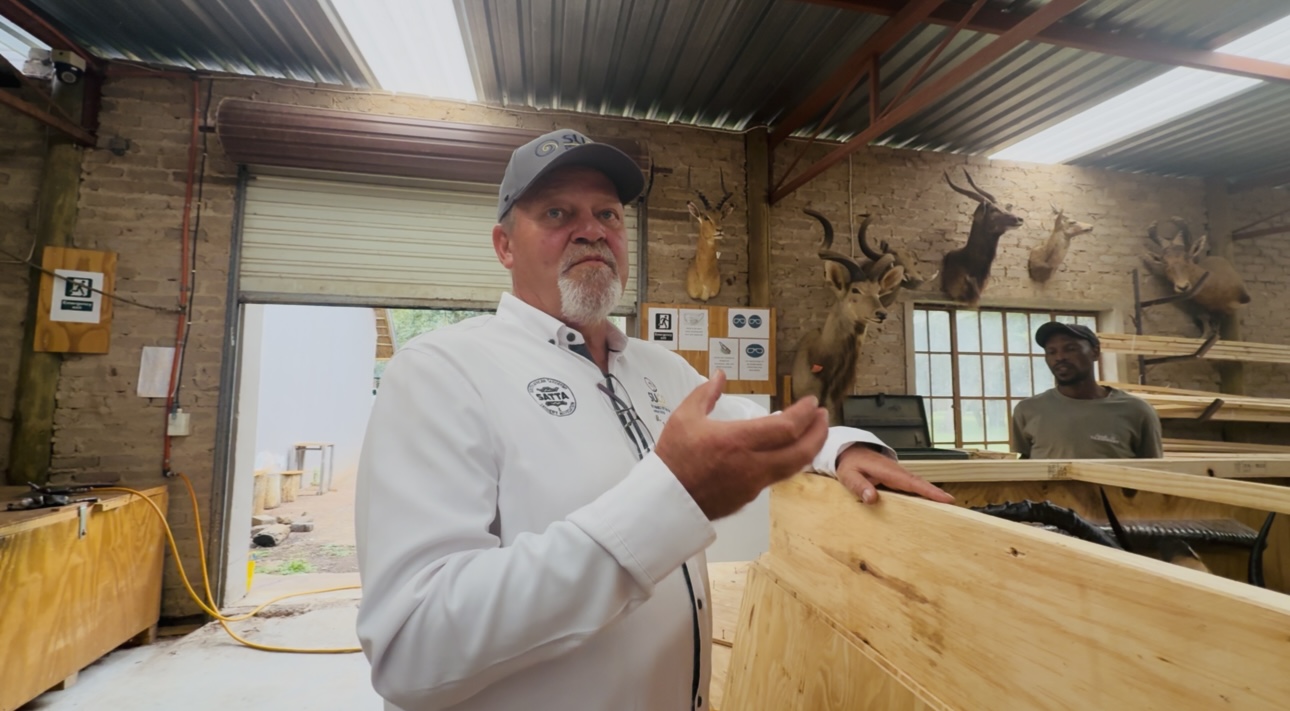
“Certain airlines allow the shipping of these trophies. I think it’s about four airlines that you can ship them overseas, but the rest refuse to take their hunting trophies to destinations. As well as the sea shipments — there’s only one ship going to America every three months. The rest of the shipping lines refuse to take hunting trophies.”
He lamented the difficulty in logistics. And yet, he sees themselves as part of a broader — and misunderstood — effort. “This anti-animal works movement created the idea that hunting is killing the animals and destroying them to extinction — but that is actually quite the opposite,” he said. “More and more, the guys are farming the animals; that is creating a better future for the animals.”
In other words: regulated, sustainable use — of every part of the animal — can coexist with conservation, economic empowerment, and community upliftment.
Next door to the taxidermy showroom, we toured a modest but hygienic meat-processing Camo Meat facility, run by people like Ina Hechter. They explained that their business started small — in 2012 as a private processing butcher for animals from farms. Around 2017 they expanded into wholesale for local markets. Export remains limited, but local demand is growing.

Their meats include species typical of the South African game-meat industry: kudu, impala, springbok, wildebeest, zebra and others. What began as a niche — somewhat stigmatised — trade is slowly gaining acceptance. Some supermarkets and lodges are carrying game meat; more restaurants are offering “veld flavour.”
Ina told me that in times of drought — when traditional livestock farming may suffer — game-meat businesses often see increased activity. Farms with overstocked wildlife or animals unable to survive drought may harvest and sell meat, skins and other resources. In this way, what might have been a loss can become income, conservation, and food security.
“Our parks are so small that they can’t sustain all the animals that are there,” Ina said. “Especially in drought years … when it’s not raining a lot you will see they die and then they sell the animals.”M
She sees game meat not only as a business, but as part of a broader sustainable economy — offering healthy, lean protein to consumers, easing pressure on overburdened habitats, and circulating value in rural and peri-urban communities.
More than meat and trophies — a conservation-economy model
What struck me during the tour was how holistic the operation is. It isn’t just about hunters bringing back trophies. It’s about using every bit of what exists: meat, skins, hides, horns, bones — even skulls, and decorative by-products. From full-body mounts to polished horn décor, from retail game-meat packages to furniture made from hoofs: this is a full-value chain.
Companies like Estelle Nel Taxidermy are members of formal trade associations and provide professional services — tanning, mounting, packing, export documentation — and in doing so, they help formalize trade in wildlife products.
Meanwhile, the game meat industry — though historically informal — is slowly growing more regulated. According to a recent national biodiversity-economy strategy, game-meat production supports economic growth, food security, and employment. The most commonly produced and consumed species: impala, kudu, wildebeest, springbok.
In other words: when properly managed, this sector has the potential to transform perceptions of wildlife — from being simply “wild animals” to resources that can feed, employ and uplift entire communities.
Challenges — logistics, stigma, regulation
But it’s not all smooth. As Pieter Swart highlighted, export logistics remain a bottleneck: only a few airlines transport trophies; shipping lines are often reluctant; sea freight to markets like the United States may come only every few months. This makes it harder for the industry to scale globally.
Domestically, the market for game meat and wildlife products still battles cultural and regulatory stigma. Many people still frown at game meat; supermarkets and restaurants are only slowly integrating it.
Regulation is another issue: for the industry to be sustainable, wildlife needs to be farmed or managed responsibly, harvesting must follow quotas, and processing must meet health and safety standards. When abattoirs, tanneries, and exporting agents comply with regulation, this gives the industry legitimacy — but it also requires oversight, capacity, and buy-in from all stakeholders.
Our visit painted a picture of a wildlife economy that’s evolving: where skilled artisans turn skins, horns, skulls into enduring art; where processors supply game meat to homes, restaurants and hotels; where farms, outfitters, taxidermists, meat processors, exporters, and even children (learning from mounted displays) all form part of an ecosystem.
It’s a world that challenges simplistic ideas of wildlife as either “pristine wilderness” or “endangered species.” Instead, it shows how — if managed with respect, regulation, and purpose — natural resources can sustain livelihoods, build economies, and forge a bridge between conservation and commerce.
For many of those involved — from Melanie Viljoen to Ina Hechter and Pieter Swart — it’s not just business. It’s home. It’s art. It’s the future.
Slider
Zimbabwe pushes youth-centred, rights-based, and community-driven reforms ahead of CITES CoP20
Published
2 months agoon
November 20, 2025By
VicFallsLive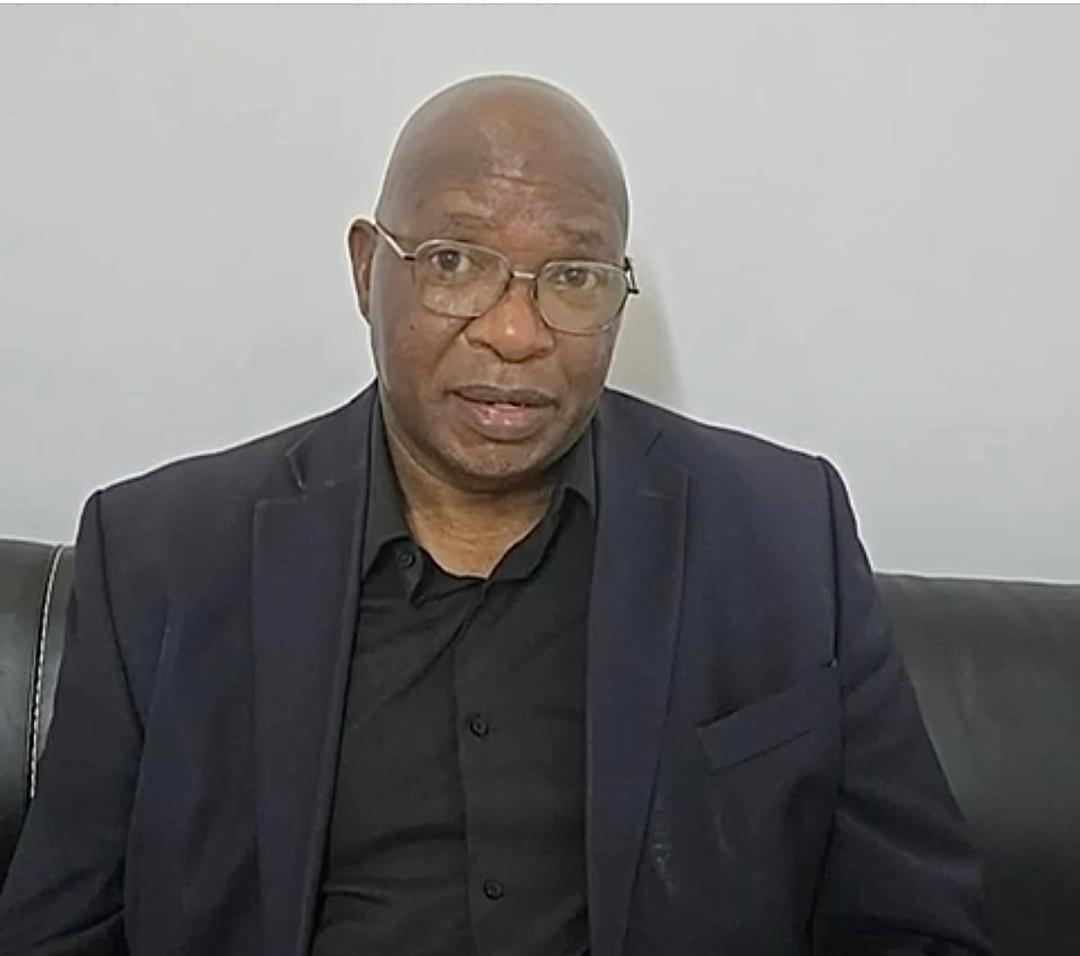
BY NOKUTHABA DLAMINI
As the world prepares for the 20th Conference of the Parties (CoP20) to the Convention on International Trade in Endangered Species of Wild Fauna and Flora (CITES), Zimbabwe has outlined a bold and comprehensive policy agenda that shifts global discussions beyond ivory and toward broader issues of sustainable use, human rights, and community empowerment.
In an exclusive interview with VicFallsLive, Dr. Agrippa Sora, board chairman of the Zimbabwe Parks and Wildlife Management Authority (ZimParks), said the country’s proposals are anchored on a simple but transformative message: wildlife conservation must deliver real benefits to the people living with wildlife.
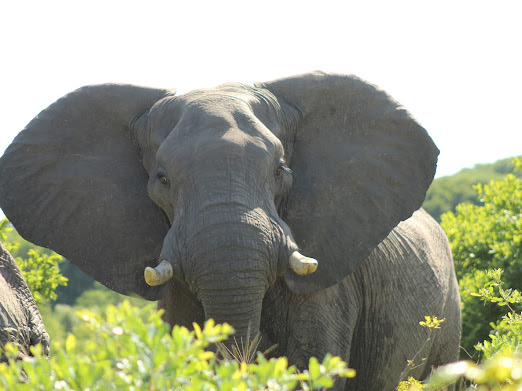 Key proposals Zimbabwe taking to CITES CoP20
Key proposals Zimbabwe taking to CITES CoP20
1. Commercial trade in elephant leather products
Zimbabwe is pushing for approval to engage in regulated commercial trade in elephant leather products. Authorities argue that this form of value addition can bring economic gains to local communities, promote sustainable use, and reduce reliance on donor funding.
2. A formal voice for communities within CITES
Zimbabwe is advocating for the establishment of an Advisory Body or Community Forum within CITES, ensuring that the voices of rural people—who coexist with wildlife—formally shape decisions on international trade, conservation restrictions, and benefit-sharing.
This push echoes one of the founding principles of CITES, which acknowledges that “peoples and States are and should be the best protectors of their own wild fauna and flora.”
3. Recognition of human rights within conservation governance
Zimbabwe’s delegation wants CoP20 to acknowledge the human rights dimensions of conservation—particularly:
- The right to safety for communities facing human–wildlife conflict
- The right to food security
- The right to benefit from natural resources within their landscapes
For Zimbabwe, these rights are inseparable from wildlife management.
Moving beyond ivory: A broader view of sustainable use
Dr. Sora emphasized that Zimbabwe does not want the CoP20 debate to be reduced to ivory.
Zimbabwe argues that without these broader interventions, the conservation model remains unbalanced—protecting wildlife while leaving the people who live among it trapped in poverty
Youth at the centre of the conservation agenda
One of the strongest themes in Zimbabwe’s CoP20 position is youth empowerment, an area Dr. Sora said is now central to national conservation policy.
“Zimbabwe is supporting the Youth Ethnic Conservation Agenda, and we want to continue empowering young people,” Dr. Sora said.
“These are young people who travel long distances between villages and shopping centres, often unaware of wildlife incidents happening around them.”
He revealed that Zimbabwe has approved the establishment of a national chapter of the CITES Rural Youth Network, a platform designed to give young rural citizens a voice in global conservation decision-making.
Dr. Sora said young people—often traveling long distances between villages and service centres—are the first responders to wildlife encounters, yet are rarely included in policy processes.
“Their inclusion is critical for awareness, safety, and community resilience,” he said.
A rights-based approach linked to national priorities
Dr. Sora linked Zimbabwe’s CITES proposals to the country’s National Development Strategy (NDS2), which prioritises poverty eradication.

“We want to ensure that communities living within wildlife landscapes receive meaningful support and benefits from the natural resources around them,” he said.
This includes promoting value addition—for example, crafting products from elephant leather—and enabling community enterprises tied to legal wildlife products.
“We are promoting opportunities for value addition so that communities can benefit economically from the wildlife with which they coexist.”
He added that the board is committed to transitioning youth from vulnerability to empowerment, ensuring access to education, business opportunities, and long-term livelihoods.
Unlocking finance through sustainable use
Zimbabwe also plans to push for financial mechanisms—particularly the sustainable use of existing wildlife stockpiles—to support community development.
“Our aim is to secure mechanisms that allow us to reinvest in these communities, strengthening their resilience and ensuring they thrive alongside wildlife.”
Zimbabwe argues that restrictive global trade rules deprive communities of funding that could improve safety, reduce human–wildlife conflict, and support conservation programs.
Zimbabwe’s position rooted in CITES founding principles
Zimbabwe’s proposals, Dr. Sora said, are consistent with the spirit of CITES itself.
The convention’s preamble affirms:
Wild fauna and flora are an irreplaceable part of the earth’s natural systems… Peoples and States are and should be the best protectors of their own wild fauna and flora… International cooperation is essential to prevent over-exploitation…
Zimbabwe believes that empowering communities, recognizing human rights, and enabling sustainable use are simply modern applications of these foundational principles.
Trending
-

 Slider3 years ago
Slider3 years agoInnscor launches brewery to produce Nyathi beer
-

 National4 years ago
National4 years agoIn perched rural Matabeleland North, renewable energy is vital
-

 Tourism and Environment4 years ago
Tourism and Environment4 years agoStrive Masiyiwa’s daughter opens luxury Victoria Falls lodge
-

 Opinion4 years ago
Opinion4 years agoA street art mural in Zimbabwe exposes a divided society
-

 Special reports4 years ago
Special reports4 years agoTinashe Mugabe’s DNA show’s popularity soars, causes discomfort for some
-

 National4 years ago
National4 years agoVictoria Falls’ pilot dies in helicopter crash
-

 National3 years ago
National3 years agoCommission of inquiry findings fail to be tabled as Victoria Falls councillors fight
-

 National3 years ago
National3 years agoHwange coal miner fires workers over salary dispute
